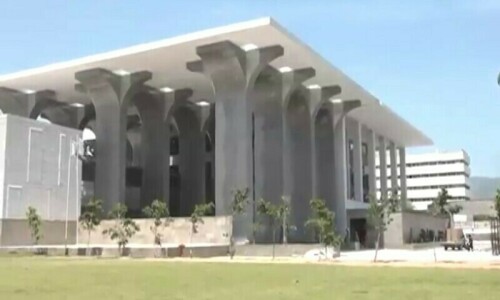WASHINGTON, July 30: Prime Minister Yousuf Raza Gilani has rebuffed demands for unilateral US action against suspected terrorist targets inside Fata, saying that such strikes further complicate an already difficult situation.
“We can do it ourselves,” Mr Gilani told a joint meeting of two Washington think-tanks, the Council on Foreign Relations and the Middle East Institute, on Tuesday night. He, however, added that Pakistan wanted better cooperation with the United States to share intelligence about foreign militants who moved freely across the rugged Pakistan-Afghan border.
The prime minister rejected the suggestion that Pakistan had failed to curb terrorism in Fata. He noted that despite having “all sophisticated weapons they need,” the US forces in Afghanistan also had failed to eradicate militancy from the areas under their control.
“If we are not able to control them, you are not able to control them (either),” he said.
Mr Gilani insisted that Pakistan was “no one’s surrogate” in the fight against extremists. “We are fighting to save the soul of our homeland.”
When asked about the federal government’s lack of control over the tribal areas, the prime minister responded that all elected senators from that region supported him.
Mr Gilani also rejected the suggestion that the ISI was not under his control. He insisted that he had direct control over the agency which would now follow his instructions. “And now I am responsible for whatever they do.”
He recalled that during the Afghan war the US supported the spy agency and it preferred to deal with military rulers.
America’s sudden withdrawal from Afghanistan, he said, “created vacuum in the region” which allowed militants to establish themselves.
Talking about his meetings with President Bush and with Republican and Democratic candidates for the 2008 US presidential election, Mr Gilani said all these leaders had assured him that they supported the new democratic dispensation in Islamabad and wanted to help establish democracy in the country.
The prime minister told the audience that Pakistan expected a similar nuclear deal from the United States that it had offered to India.
“There should be no preferential (treatment), there should be no discrimination. And if they want to give civilian nuclear status to India, we would expect the same for Pakistan too,” he said.
Mr Gilani said that the Khan network was no more active, when a questioner suggested that because of the activities of this network Pakistan cannot be offered a nuclear deal.
“Certainly it cannot happen again and that chapter is over. The network is broken,” said Mr Gilani. He said that the civilian government in Islamabad wanted to have good relations with India, was working for enhancing bilateral trade and would like to resolve all issues, including the “core issue” of Kashmir.
On Kashmir, Mr Gilani said: “They (the United States) should encourage and support this issue. That means only they can understand,” but refrained from asking Washington to play the role of a mediator.
However, when pressed by president of the Council on Foreign Relations Richard Haas on whether Washington should appoint a special envoy or play a high-visibility or mediatory role, Mr Gilani quipped: “Actually what the United States really want, they can do it.”
Although the prime minister’s formal address was a well-prepared document, which successfully presented Pakistan’s case in the war against terror, balancing domestic concerns with its international obligations, the question-answer session was a different story.
Apparently, the prime minister had come to the meeting without proper briefing and preparations.
It was obvious that the format was difficult for him. And it did not help that the CFR president conducted the meeting.
The method he used – a combination of wit and probe – could have shaken even a seasoned speaker and had the desired effect on the prime minister as well. Later, some in the audience observed that the prime minister’s team had failed him.
A PPP enthusiast suggested that “this was a conspiracy to make the prime minister look bad”.
Others saw no conspiracy but they, too, appeared unhappy.













































